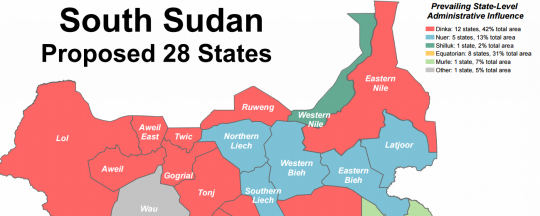South Sudan’s President Salva Kiir has agreed with his two vice presidents to form a committee to review the “the issue of the 28 states,” while some critics both inside and outside of the new coalition government remain fiercely opposed to the 28 states and demand a return to ten states.
The president last October announced the creation of 28 states, in a decree known as the Establishment Order. He then appointed 28 new state governors in December, and he has vowed never to back down from the decision. But critics have tried to pressure him over the new states claiming that the decree violates the peace agreement signed in August 2015 and is economically impossible to implement at this time.
Riek Machar, the head of SPLM-in-Opposition and Kiir’s first vice president under the terms of a power-sharing deal, appeared on SSTV last night alongside Kiir’s second deputy James Wani to announce the formation of a committee composed of 15 members, “So that they can work on the number of states, review them and they come up with recommendation on the number of the states and this will be within 30 days.”
“We decided to tackle this through a committee. That committee will be composed of 15 members. Ten will be South Sudanese who will be nominated by the parties to the government, and the other five will come from the international community in Africa… three from Troika specifically, and two we have asked our comrades South Africa and Tanzania to join that committee,” he said.
Members of the Troika, however, have not yet confirmed whether they agree to participate in this committee. Moreover, representatives of the two main parties to the peace agreement, contacted by Radio Tamazuj today, offered starkly different explnanations of the purpose of the committee.
Ateny Wek, Press Secretary of the President, said the committee’s purpose is not to discuss a reversal of the Establishment Order but rather only to discuss the borders of the 28 new states that it seeks to establish. He said that the committee will “discuss the issue of the borders of the 28 states.”
Asked whether it will discuss only the borders of the 28 states or rather the number of states itself, Ateny replied, “The importance of the committee is specifially to settle the borders and see the problems that bother the states.”
“The committee can increase the number of states… but it’s impossible that it could be less than 28 states. Because nobody will accept that his state will be removed. Nobody will want that,” he said.
This was contradicted by Ramadan Hassan Lako, a top member of the SPLM-in-Opposition, the part of the first vice president. “With due respect to the spokesperson of the government [Ateny Wek], he is only one individual,” he told Radio Tamazuj today.
“The peace agreement speaks about ten states and not 28 states or more states than that,” he said. “This is our position.” Ramadan, who heads the federalism dossier for SPLM-IO, pointed to economic reasons as well as social peace among the tribes as the two main reasons for oppositiong the 28 staes.
“The agreement speaks about ten states,” said Ramadan. “From the economic perspective the situation is really bad now, the dolalr prices are high, so we spoke about this and we said let us start with ten states and… this will be better for development.”
In another interview today, Onyoti Adigo, the Minority Leader in Parliament and deputy head of the Democratic Change Party, voiced fierce opposition to the 28 states, saying they will not accept anything but a return to the ten states established by South Sudan’s constitution.
Although Onyoti’s coalition of political parties are entitled to one representive for the committee, Adigo said they will not nominate a member to particpate unless the terms of reference are clarified. He says he does not expect the committee to change the 28 states and he says they will not accept the outcome of the committee unless they accept a return to ten states as described in the peace agreement.
“Of course the decision of the presidency yesterday was a right decision, its formation was good, but the important thing is the terms of reference for the work of those people, the base for their work. We want this committee to look into the problems of 28 states,” said Adigo.
“There was no any studies carried out on 28 states, it was a decision of certain people who wanted to sabotage South Sudan,” he added. “There are problems caused by the 28 states, the current economic crisis, as we speak there are people who did not get salaries for three months, four month and two months, it is a problem of 28 states.”
Adigo stressed, “Of course we are still rejecting it until now, we will not accept 28 states, now there is no room for 28 states or 13 states or 50 states, and we demand 10 states according to the agreement.”
Related:
How the Establishment Order has affected healthcare in South Sudan (30 June 2016)



